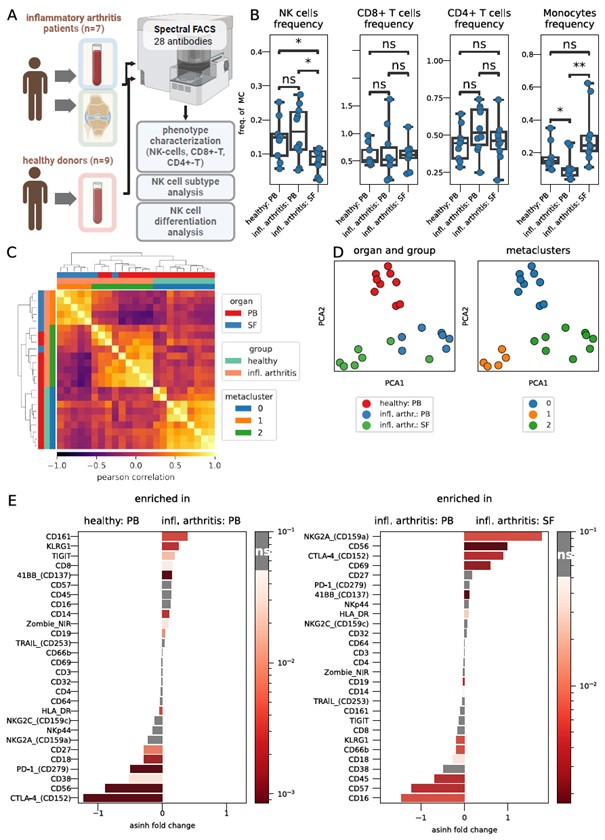Session Information
Session Type: Poster Session B
Session Time: 10:30AM-12:30PM
Background/Purpose: Synovial natural killer (NK) cells contribute to inflammation in arthritis by secreting cytokines and modulating synovial fibroblast activation. The aim of this study is to describe systemic versus local inflammatory changes of NK-cell subsets as well as their physical cell-cell interactions in arthritis patients.
Methods: Spectral flow cytometry was used to compare paired peripheral blood (PB) and synovial fluid (SF) immune cells from patients with active inflammatory arthritis and healthy controls. Physical cell-cell interactions within tissues were studied by applying a recently developed cellular interaction mapping framework Interact-omics (Vonficht et al., 2025, accepted in Nature Methods).
Results: Our paired approach revealed significant local enrichment of immature and activated NK-cells in SF, characterized by elevated markers of early differentiation, immune checkpoint regulation, and tissue residency, highlighting tightly controlled immune activation at inflamed sites. Single-cell analysis confirmed heterogeneity within SF-NK-cells, suggesting multiple co-existing activation states and developmental stages. PB-NK-cells from patients differed profoundly from healthy controls, showing less immature NK-cell subsets and an enrichment of mature, pro-inflammatory subsets indicative of systemic immune activation. Cellular interaction mapping revealed mainly NK/neutrophil interactions of patients’ NK-cells, while interactions with B-cells, T-cells or monocytes were negligible. T-cells also displayed profound local and systemic alterations. Cellular interaction mapping revealed that next to NK-cell/neutrophil interactions, interactions between B-cells with monocytes and T-cells with neutrophils characterize joint inflammation.
Conclusion: This paired high-dimensional analysis revealed systemic and local alterations in NK-cell subsets shaped by co-existing developmental stages and immune regulatory mechanisms. Cellular interaction mapping indicated that neutrophils are a main interaction partner of NK-cells in inflamed joints.
 NK cells display phenotypic changes in peripheral blood and synovial fluid in patients with inflammatory arthritis. A Graphical experimental design. B Cell frequencies. Frequencies of the indicated cell types were plotted as a percentage of PBMC. C Sample correlation analysis on a pseudobulk level. NK cells were correlated as described in the methods section. Hierarchical clustering revealed three subgroups which correspond to cells of different tissue and patient group (healthy and inflammatory arthritis). D Sample-wise principal component analysis. Samples were grouped by PCA and colored by tissue and patient group (left) and the metaclusters (right) as calculated in C. E Differential expression analysis. Fold-changes (x-axis, asinh_fc) were calculated as described in the Methods section. Notably, NK cells analyzed from peripheral blood show significant phenotypic differences comparing healthy controls and patients with inflammatory arthritis, including expression changes of CD161, KLRG1, PD-1 and CD56. Comparison of NK cells extracted from peripheral blood and synovial fluid show a differential phenotype with the elevation of activation markers such as NKG2A and CD69 and the corresponding downregulation of CD16 and CD57. PB: peripheral blood, SF: synovial fluid. P-values were calculated as described in the methods section where p-values above 0.05 were considered not significant (n.s.).
NK cells display phenotypic changes in peripheral blood and synovial fluid in patients with inflammatory arthritis. A Graphical experimental design. B Cell frequencies. Frequencies of the indicated cell types were plotted as a percentage of PBMC. C Sample correlation analysis on a pseudobulk level. NK cells were correlated as described in the methods section. Hierarchical clustering revealed three subgroups which correspond to cells of different tissue and patient group (healthy and inflammatory arthritis). D Sample-wise principal component analysis. Samples were grouped by PCA and colored by tissue and patient group (left) and the metaclusters (right) as calculated in C. E Differential expression analysis. Fold-changes (x-axis, asinh_fc) were calculated as described in the Methods section. Notably, NK cells analyzed from peripheral blood show significant phenotypic differences comparing healthy controls and patients with inflammatory arthritis, including expression changes of CD161, KLRG1, PD-1 and CD56. Comparison of NK cells extracted from peripheral blood and synovial fluid show a differential phenotype with the elevation of activation markers such as NKG2A and CD69 and the corresponding downregulation of CD16 and CD57. PB: peripheral blood, SF: synovial fluid. P-values were calculated as described in the methods section where p-values above 0.05 were considered not significant (n.s.).
To cite this abstract in AMA style:
Deicher F, Exner T, Claus M, Yousefian S, Rodon L, leonhardt s, Distler J, Watzl C, Lorenz H, Haas S, Hübschmann D, Merkt W. Compartment-specific NK-cell phenotypes reveal distinct maturation and activation states in inflammatory arthritis [abstract]. Arthritis Rheumatol. 2025; 77 (suppl 9). https://acrabstracts.org/abstract/compartment-specific-nk-cell-phenotypes-reveal-distinct-maturation-and-activation-states-in-inflammatory-arthritis/. Accessed .« Back to ACR Convergence 2025
ACR Meeting Abstracts - https://acrabstracts.org/abstract/compartment-specific-nk-cell-phenotypes-reveal-distinct-maturation-and-activation-states-in-inflammatory-arthritis/
